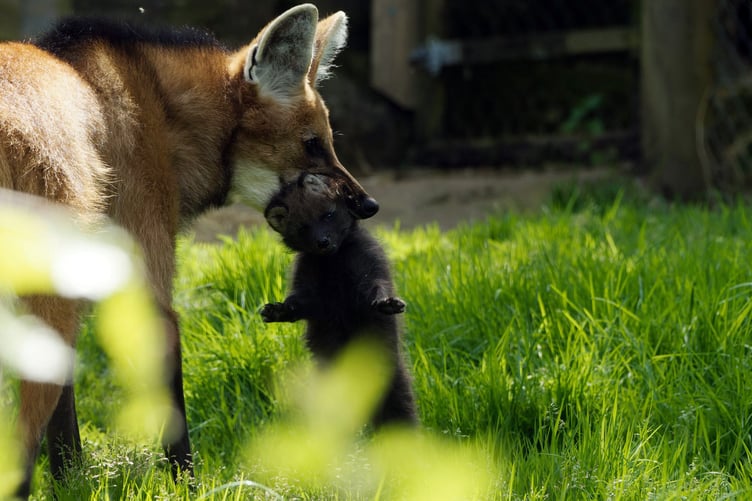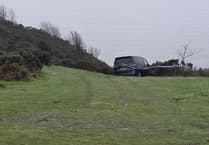THE first maned wolf to be born on Exmoor has been seen in public, carried in the jaws of his mother.
Maned wolves are not really a wolf, but a large fox-like dog on ‘stilts’, standing at least a metre tall at the shoulder, which evolved to make a living on the Patagonian grasslands of South America.
Now, the largest canid of South America has given birth for the first time in Exmoor Zoo to parents ‘Sabrina’ and ‘Nephew’.
Also known as the ‘skunk wolf’ they have a strong sweet smell which can often be smelled in the zoo car parks on a hot, summer day.
A litter can consist of up to six individuals and when first born, like most dogs, they are blind and with dark brown fur for camouflage.
By about 10 weeks of age they develop their typical red coat, and white tipped tails begin to appear.

+ 3
(View All)
Maned wolf mum Sabrina can be seen carrying her new-born puppy at Exmoor Zoo.
The maned wolf puppy will be reliant on his mother’s milk for another three months, although mum and dad have already begun to regurgitate meals for it in their den.
Zoo director Danny Reynolds said: “We have been part of the breeding program for 15-plus years.
“Initially, we just exhibited males, so a female from the breeding programme really got us very excited.
“Maned wolves typically only breed once a year and within eight weeks of her arrival from Shepreth Zoo she had given birth.
“Maned wolves are a species in decline in the wild.
“Threatened due to habitat destruction and persecution from farmers, it is a wonderful achievement for all of us at Exmoor Zoo.”
Zoo curator Derek Gibson said: “The little pup has been doing great and we are looking forward to watch as he grows into his legs.”
Maned wolves have long legs which is likely to have been down to evolution from the long grassland habitats in which they live.
Unlike other dogs they have a diet that consists of 50 per cent fruit.
The Patagonian fruit lobeira which means ‘fruit of the wolf’, was named after their penchant for it.
Unfortunately, they also like chicken, which has bought them into conflict with subsistence farmers in Patagonia, to their detriment.
Visitors to the zoo have now been able to see the puppy starting to join his parents outside more often, six weeks since his birth.




Comments
This article has no comments yet. Be the first to leave a comment.